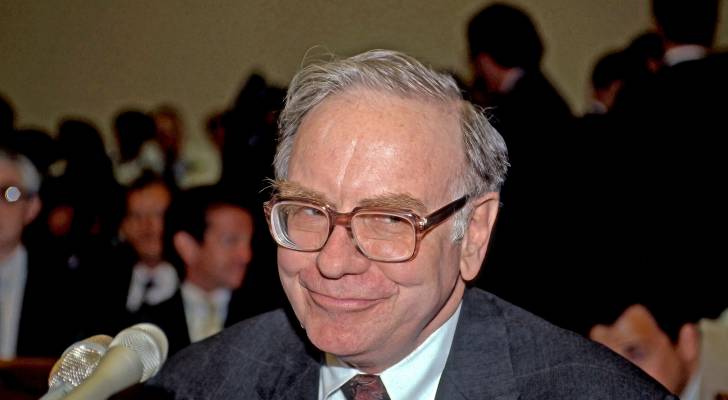
According to legendary investor Warren Buffett, there’s a very simple strategy with the potential to outperform even the most complex (and elite) hedge fund strategies — and it doesn’t cost an investor any extra time or money to use it.
Over the years, Buffett has repeatedly emphasized that any investor with little or no knowledge of the equity market can still grow a profitable portfolio using a passive investment strategy.
At one point Buffett — known as the Oracle of Omaha — was so confident in the use of index funds that he confidently wagered $1 million against a basket of hand-picked hedge fund equities chosen by Ted Seides from Protégé Partners. It was 2007 and Buffett chose the Vanguard 500 Index Fund Admiral Shares (VFIAX), a popular index fund among US investors. For the next 10 years, the earnings of the VFIAX and the basket of equities was closely monitored.
The outcome? Buffett triumphed — decisively.
Buffett shared the final scorecard of the bet in his 2017 shareholder letter. The index fund he selected delivered a total gain of 125.8% during the decade, while the five funds-of-funds as chosen by Seides delivered a total gain of 21.7%, 42.3%, 87.7%, 2.8% and 27.0%, respectively, during the same period.
What can investors learn from Warren Buffet’s $1 million wager?
What can investors and those saving for retirement take from Buffett’s wager? That it’s 100% achievable to build a winning investment portfolio as long as you focus on diversification and keeping fees low. Here are two strategies to put these simple investing techniques into practice.
Keep fees low
Fees should not be overlooked as this cost can eat into your returns. In an op-ed for Bloomberg titled “Why I Lost My Bet With Warren Buffett,” Seides agreed with Buffett on the subject of hedge funds’ management fees.
“He is correct that hedge-fund fees are high, and his reasoning is convincing. Fees matter in investing, no doubt about it,” he wrote.
Rather than focus on high-priced hedge funds or expensive mutual funds, investors can use an online brokerage account and select from dozens of low-cost exchange-traded funds (ETFs).
For instance, the Vanguard S&P 500 ETF (TSX:VOO), which follows the S&P 500, has a low expense ratio of 0.03%, which means for every $1,000 invested, you only pay $3 in fees. Similarly, the SPDR S&P 500 ETF Trust (TSX:SPY) tracks the same index and carries an expense ratio of 0.0945%.
Focus on diversification, not cherry-picking a winning stock
Passively managed funds, such as index funds, do not actively trade their basket of equities to try and beat the market. Instead, passive funds allow investors to hold a basket of funds — offering diversification — while allowing investors to capitalize on gains, when the market goes up (or suffer losses, if the market goes down).
These funds are good for investors for three reasons:
- Over time, the stock market consistently rises over time.
- It’s difficult (or nearly impossible) to predict which stocks will outperform and beat the market.
- Fees erode investor returns, so it’s best to keep them as low as possible.
Index funds to invest in as a Canadian investor
Online brokerage accounts offer access to an incredible selection of low-fee ETFs with low-fees and excellent track records. For instance, consider:
- Vanguard Canadian Short-Term Corp Bond IDX ETF (TSX:VSC)
- Vanguard Canada Inc S&P 500 Index EFT (TSX:VFV)
- Vanguard S&P 500 ETF (VOO)
- Vanguard FTSE All Cap Index ETF (TSX:VCN)
- iShares Core S&P 500 ETF (TSX:IVV)
- SPDR S&P 500 ETF Trust (TSX:SPY)
- Vanguard Total Stock Market ETF (TSX:VTI)
Where to buy index funds
To buy cost-effective ETFs, you’ll need an online brokerage account. Good options include:
- [CIBC Investor’s Edge]: Get 100 free trades when you open a CIBC Investor’s Edge account using promo code EDGE2425. Plus, get $200 or more cash back. Qualifying steps apply.
- Questrade: Move your existing accounts to Questrade, and get a rebate on the transfer fees charged for the switch.
Bottom line
To find out more about the best ETFs to buy in 2024, check out the Money.ca guide on Canadian ETFs. For investors who don’t want to go it alone, consider using a robo-advisor. To learn how robo-advisors work, read the Money.ca guide on the best Canadian robo-advisors.
As for earnings from that legendary $1 million bet? Buffett gave all proceeds to the Omaha, Nebraska-based charity, Girls Inc. Turns out that the biggest winner of Buffett’s bet were the girls.
Sources
1. Bloomberg: Why I lost my bet with Warren Buffett (May 3, 2017)
—with files from Romana King
This article Here’s why Warren Buffett favours simple investing techniques — and isn’t a fan of hedge funds and portfolio managers that promise outsized market gains originally appeared on Money.ca
This article provides information only and should not be construed as advice. It is provided without warranty of any kind.